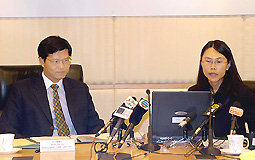 |
| Pest control: Food & Environmental Hygiene Department Consultant Dr Ho Yuk-yin and Pest Control Officer Fok Ming-yan warn about mosquitoes breeding in high-rise buildings. |

|
A Food & Environmental Hygiene Department study has found 44% of the 72 high-rise buildings surveyed have a mosquito-breeding problem.
In addition, 7.7% of the 537 households studied recorded a positive ovitrap reading.
The Government said it is a clear indication the mosquito problem may become serious if anti-mosquito efforts are neglected at home.
Upon the advice of a World Health Organisation expert last year, the department included residential buildings in its ovitrap study to have a better understanding of the local situation and the behaviour of the local vector.
The study also aimed to arouse public awareness of the importance of preventing mosquito breeding at home.
Height no barrier for mosquitoes
Department Pest Control Officer Fok Ming-yan said: "While the breeding of Aedes albopictus was detected, no other species, such as Aedes aegypti, which is the most important vector for the transmission of dengue fever worldwide, have been found in the study."
She warned that breeding of Aedes albopictus can take place in high-rise households if conditions are favourable. Mosquitoes' ability to reach high floors or elsewhere in the building should not be underestimated.
She reminded building residents and management to pay particular attention to potential mosquito breeding grounds.
"These measures include scrubbing vases and potted-plant saucers at least once a week, proper disposal of containers such as soft drink cans or lunch boxes, clearing air conditioner drip trays regularly to ensure they are free of stagnant water, and drilling large holes in old tyres," she said.
Department Consultant Dr Ho Yuk-yin called for full community support for the third phase of the Anti-mosquito Campaign 2003, which is in force until October 4. Active participation by all people will help reduce the threat of Dengue fever.
Ovitrap indices and advice on anti-mosquito measures are available on this website.
Imported Dengue case confirmed
Meanwhile, the Department of Health today confirmed one more imported case of Dengue fever, bringing the total number of the reports to 37 - all are imported.
The patient is a 10-year-old girl. She developed a fever, mild headache and abdominal pain on September 11 after visiting a Southeast Asian country.
She was admitted to the hospital on September 17 and is now in stable condition.
Go To Top
|



